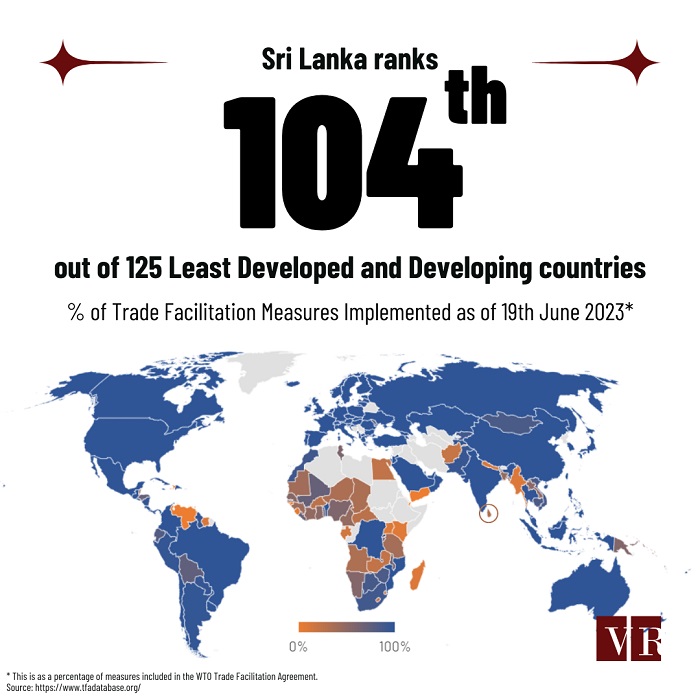
Sri Lanka ranks 104th out of 125 developing and least developed countries (LDCs) in its implementation of trade facilitation measures over the last six years, a new study by Sri Lankan thin-tank, Verité Research has found.
According to the think-tank, alarmingly, 21 out of 35 LDCs have a higher rate of implementation than Sri Lanka, which has progressed only marginally from a rate of 29% in 2017 to 31.5% in June 2023.
Sri Lanka has also claimed to have less capacity than LDCs to implement trade facilitation measures. For example, the country has stated that it cannot implement over 69.3% of the trade facilitation measures without external assistance.
By contrast, developing countries and LDCs on average claim to require external assistance to implement only 21.7% and 40% of trade facilitation measures, respectively. Of the 125 LDCs and developing countries party to the World Trade Organisation’s Trade Facilitation Agreement (WTO TFA), only 10 countries (including Sri Lanka) have requested external assistance to implement over 69% of trade facilitation measures.
The study by Verité Research compared Sri Lanka’s progress in trade facilitation against its regional competitors, other developing countries, and least developed countries. Country-wise information published by the World Trade Organisation in its trade facilitation database was used for this comparison. The database contains the commitments and notifications on the progress of the implementation of trade facilitation measures, by countries that are signatories to the WTO TFA.
Verité Research proposes three steps Sri Lanka can take to outperform LDCs and catch up with its peers. It also identifies 10 trade facilitation measures Sri Lanka can prioritise and implement without delay.
The first step is for Sri Lanka to take action to implement measures on its own, without delaying implementation by waiting for external assistance. For example, the country claims it cannot promptly publish information on trade procedures, taxes, fees etc., in a non-discriminatory and easily accessible manner, without external assistance. However, 54% of the LDCs and 80% of the developing countries state that they have already implemented this, or can implement it on their own, without external assistance. This stance taken by Sri Lanka reflects poorly on the country and sends a negative signal to potential traders and investors.
The second step is to provide high-level leadership to overcome the resistance of government agencies to trade facilitation implementation and to influence the allocation of necessary resources to facilitate implementation. The National Trade Facilitation Committee (NTFC) of Sri Lanka, established to spearhead the implementation of trade facilitation measures, is co-chaired by the director general of Sri Lanka Customs and the director general of the Department of Commerce. This is in stark contrast to countries like Vietnam, India, and Bangladesh, (all three have made better progress than Sri Lanka) where the NTFC is chaired by the deputy prime minister, cabinet secretary and minister of commerce, respectively.
The third step is the publication of the trade facilitation action plan and instituting a mechanism to monitor and report progress. For example, India has published its trade facilitation action plan online and has instituted a robust system to monitor its progress. As a result, the country has not only fully implemented all the trade facilitation measures included in WTO TFA, but is moving beyond WTO TFA by implementing additional measures to further facilitate trade.
The full study by Verité Research can be accessed via: https://www.veriteresearch.org/publication/sri-lanka-falls-behind-least-developed-countries-trade-facilitation/ (NewsWire)


